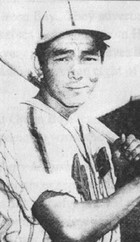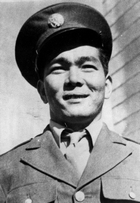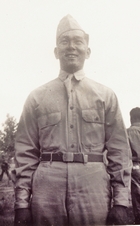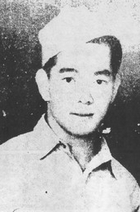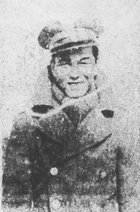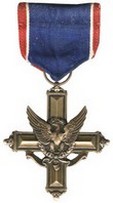Joe Takata
| Date and Place of Birth: | April 29, 1919 Waialua, Hawaiian Islands |
| Date and Place of Death: | September 29, 1943 Monte Milleto, Italy |
| Baseball Experience: | Amateur |
| Position: | Outfield |
| Rank: | Sergeant |
| Military Unit: | 100th Battalion, US Army |
| Area Served: | Mediterranean Theater of Operations |
"We owe him a debt of gratitude that can never be repaid."
Lieutenant General James Campbell, US Army Pacific commanding
general
Joseph Shigeo "Joe" Takata was born on April 29, 1919 at Waialua in
the Hawaiian Islands in the shadow of Mount Kaala where the sugar cane
swept up to the foothills of the highest peak on Oahu on one side and
sloped down gently to the sea on the other.
Like many people in Hawaii, he was Nisei - second-generation Japanese.
And like many Nisei, he loved baseball.
Takata attended McKinley High School where he quickly earned a
reputation as a power-hitting shortstop. "I can still see Joe there at
shortstop," remembered his coach Frank J Hluboky, ten years after the
ballplayer's death. "the way he ran out to his position, the way he
hustled.
"He was a hard worker, that boy. The first to come out for practice and
the last one to leave, after helping to put away the equipment. He was
like a good leader."
In his senior year at McKinley in 1937, Joe helped bring a championship
to the school in a three-game play-off with St Louis College.
After graduation Takata worked as a stevedore for Castle & Cooke, and
went on to star as an outfielder in the amateur Hawaii Baseball League
with the Azuma and Asahi teams.
Takata entered military service November 15, 1941. Three weeks later
Pearl Harbor was attacked by the Japanese. While most Japanese-Americans
were sent to internment camps, the Japanese-Americans of the Hawaiian
Territorial Guard became the 100th Infantry Battalion. Two weeks before
leaving for basic training with the 100th at Camp McCoy, Wisconsin,
Takata married the beautiful Florence Sakamoto from Honolulu.
Assigned to the 100th in Wisconsin as Recreational and Morale Officer
was Captain Katsumi "Doc" Kometani, who had been the franchise owner of
the Asahi team. Shortly after the battalion's arrival at Camp McCoy.
Kometani organized the Aloha baseball team. Takashi "Ted" Hirayama was
selected as team manager and remembers Takata well. "He was a natural
athlete, with a good swing and good enough speed," says Hirayama. "Joe
had a really good arm. so he played shortstop and centerfield."
The Aloha team initially played against the military police unit at Camp
McCoy but soon found competition in nearby towns. In a memorable game
against a minor league team in Green Bay, Wisconsin, Takata was part of
an outstanding defensive play. "An opposing batter hit a towering drive
over our rightfielder's head," Hirayama remembers. "After the outfielder
retrieved the ball, he threw it to Joe, who was playing center. Joe
relayed it on a line to our second baseman, who then turned and threw
the ball on one skip to the catcher, who tagged the surprised runner
out. Joe's throw to the second baseman was outstanding. I still remember
the announcer saying that it would take a major league team to make a
play like that, and these little guys from Hawaii just did it. They play
like pros."
In February 1943, the 100th Battalion moved to Camp Shelby, Mississippi
for advanced unit training. The Aloha team continued to play and in a
game against an Army team at the internment camp in Jerome, Arkansas,
Takata showed his power with a home run that was the longest drive ever
seen in that field.
The 100th Battalion left Camp Shelby for North Africa on August 11,
1943. They landed at Oran, Algeria on September 2, where they guarded
supply trains for a couple of weeks. There was still time for some
baseball in North Africa. Takata was one of five 100th players selected
to join the 133rd Infantry Regiment team in a game against the 168th
Regiment - undefeated champions of North Africa. With the help of the
Hawaiian players the 133rd won the game. "It was a close game all the
way to the ninth inning," explains Hirayama.
It was in North Africa that the Aloha baseball team played their last
game. Challenged by the 133rd, the 100th called upon Lieutenant Paul E.
Froning, who had just joined them. Froning would pitch in the minors
after the war and helped defeat the 133rd, 26 to 0.
On September 19, 1943, the 100th Battalion left the relative safety of
North Africa for Italy. They landed at Salerno and advanced to their
first objective - Monte Milleto. Sergeant Takata's platoon led the rest
of the battalion along a portion of road bordered by a gully on one side
and an olive grove on the other. It was 9.15am on September 29, 1943. It
hadn't stopped raining all night. Suddenly the platoon was trapped by a
hail of machine-gun, mortar and artillery fire. "As soon as the machine
guns opened fire, the [artillery] fired," recalled Sergeant Tokuichi
Koizumi some years later. "On the left flank was open ground. We tried
to get around the right side, but there was a ravine there and the guns
already were zeroed in on the place.
"A shell landed. It hit the ground in front of Sergeant Takata. He was
alive for about two minutes. He couldn't talk ... I never forget that
day. I never forget him. He was one of the best."
The 100th Battalion eventually silenced the enemy but their baseball
hero and leader, Joe Takata, was dead before the fighting was over.
The Takata family and his young widow, Florence, were devastated when
the news reached home. Instead of following the Japanese custom of
distributing tea or coffee, a custom traditionally followed in honor of
the memory of the dead after 49 days, the Takata family decided to give
a $400 contribution to the Red Cross, Army relief fund, Navy relief fund
and Honolulu Community Chest. "The war has come closer home to the
Waialua community and to me when it claimed my husband as its first
casualty," his widow explained at the time. "We feel that it has become
our duty to do more for the war cause here on the home front and forget
all the old customs. This idea received the wholehearted approval of
both the Takata family and my parents."
For "extraordinary gallantry in the face of enemy fire," Takata was
posthumously awarded the Distinguished Service Cross which was presented
to Florence on June 11, 1944 by Colonel Kendall J Fielder.
"Joe was a jovial, good natured guy who had that amazing zest for life
few have," remembered Tokuji Ono, who led Takata's squad after his
death. "You'd first think of Joe as the kind of guy everyone likes. He
did things wholeheartedly whether it was baseball or Army Training."
"He was a master soldier. A great athlete, a great leader," remembered
Lieutenant Colonel Farrant L Turner, Takata's battalion commander, at a
remembrance ceremony in 1955. "He would have gone on to great things if
he had not died."
In September 1946, an American Legion Post was named in his honor. Joe
Takata is buried at the National Memorial Cemetery of the Pacific in
Hawaii.
In June 2003, the baseball field at Hawaii's Fort Shafter was named Joe
Takata Field in his honor. "Renaming the baseball field is the Army's
way of paying a lasting tribute to a fine athlete and soldier who
sacrificed his dreams for the cause of freedom, and paid the ultimate
price," said Lieutenant General James Campbell, US Army Pacific
commanding general. "We owe him a debt of gratitude that can never be
repaid."
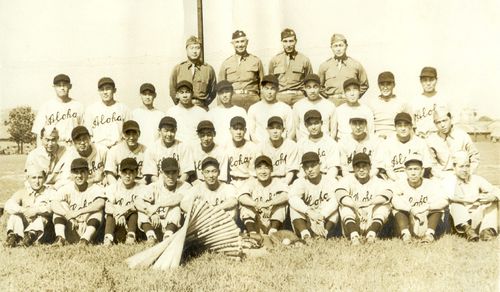
100th Battalion baseball team
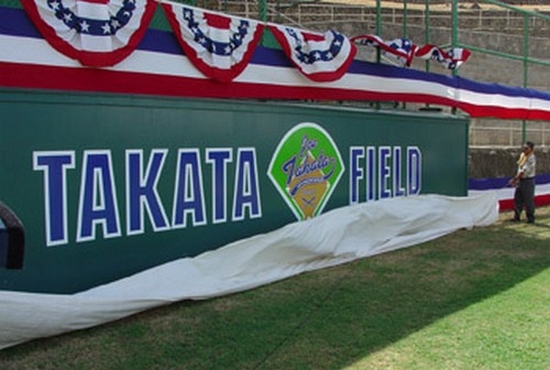
The unveiling of Joe Takata Field at Fort Shafter, Hawaii
Thanks to Kerry Yo Nakagawa of the Nisei Baseball Research Project and Hawaii State Library for help with this biography. Photo of 100th Battalion team courtesy of Sons and Daughters of the 100th Infantry Battalion Archives. Visit www.ajawarvets.org for more information on Americans of Japanese ancestry servicemen. Thanks to the Honolulu Advertiser for supplying copies of related press articles.
Date Added: January 28, 2012 Updated February 7, 2013
Baseball's Greatest Sacrifice is associated with Baseball Almanac
Baseball's Greatest Sacrifice is proud to be sponsored by

